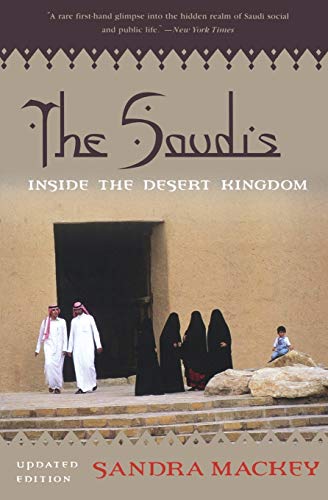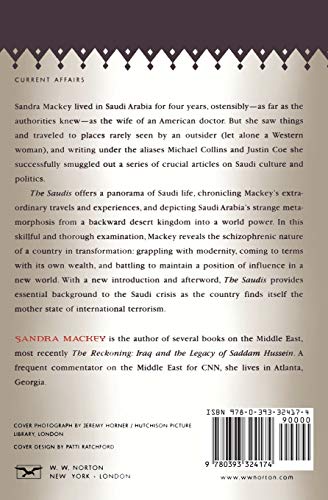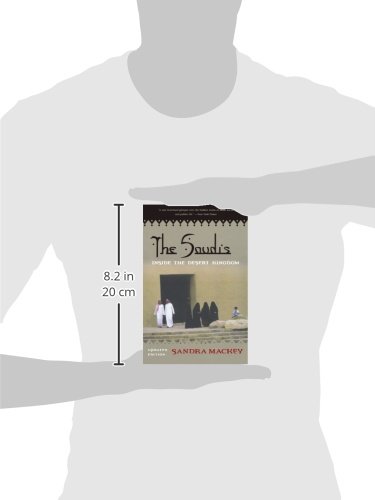



The Saudis: Inside the Desert Kingdom
D**.
This is an inside look at Saudi Arabia and the U. S.
I read this book frequently because it is one of the best books I have read about Saudi Arabia. It really explains the reason behind 9/11 and our rocky relationship between Saudi Arabia and the United States
K**E
Americans should read this
Revealing insight into Saudi culture and history. Americans could benefit from learning the persective of people in another part of the world. The American way is not the only way or necessarily the best way. Just another way to live. This nation views itself differently than we do. They have leapfrogged centuries in terms of industry, technology and way of life. Incredibly interesting and rich with personal experiences.
M**H
Great Customer Service
A must-read!
J**S
Five Stars
Great!
C**S
A Good Single Volume History Book on Saudi Arabia
Try not to look at this as a current day window into Saudi Arabia. While it might have been contemporary when it was published, it is now a history book. It has become a very good single volume read on Saudi Arabia up through the beginning of the 1980's. A lot of the culture and the paradigms still exist, but you don't have the Mattawan running around beating Western women for not adhering to the dress code, though they do expect decorum and conservative norms to be followed. The one time the Mattawan ordered me to tell my wife to cover her hair, she simply pulled a Red Sox cap out of her purse and donned it. The Mattawan thought that was just hysterical, but he went on his way. I lived in Riyadh for three years (just left) and while I missed getting a beer at a bar or having a glass of wine with dinner, life went on and we genrally enjoyed our stay.I read this book before I arrived in the Kingdom and I felt it gave me a very keen understanding of the Saudis. Yes, it is very dated now and Saudi Arabia has taken a lot of steps forward, but the book is rich in the history and political challenges of when it was written, and it is still useful for anyone wishing to better understand Saudi Arabia. You have to be very careful what you say and what you do here, and the book helps frame why this is so.I referenced it in my Master's Thesis to the disapproval of my professor, who did not consider Mackey a literary source. I argued it and in the end kept my references (I suggested the professor come out to Riyadh and see for himself if Mackey was right or wrong, and the matter quietly dropped).Finally, I thought it was very well written and well researched. I can see why it got negative reviews -- it is not always kind -- but I found it a very useful precursor to my arrival and the subsequent three years of residence that followed.
S**U
Great book!
I truly enjoyed this book. If you want to know about the history and the people of Saudi Arabia, then this book is for you.Sandra Mackey lived and worked in Saudi Arabia during its boom days, and wrote about her experiences in Saudi Arabia under different names to hide her identity from Saudi officials. In the early seventies, any foreigner caught writing about Saudi Arabia without the authorization of the Ministry of Communication was either imprisoned or swiftly deported from the country. Sandra Mackey had to remain undercover, and used many different names as author in the articles she sent abroad. She recounts how there were tense moments when she thought she had been identified by Saudi officials, and had to take her documents out in the desert to burn them. She also gave her articles to friends leaving the country to give them to her publishers. Those were the early days when email was still non-existent!This book will give you a pretty detailed look at life in Saudi Arabia as lived by the Saudis and as seen through the eyes of the expatriates living there. Many situations will seem bizarre to people not familiar with this country or its people.Sandra Mackey traces the history of Saudi Arabia back to its founder, King Abdul-Aziz. She describes how he united the different tribes together; how he then ruled over his kingdom; how he averted an uprising that almost overthrew him; how he controlled his people by the use of religion; and his strategy of keeping Saudi Arabia united and under his rule. His motto was to pay off his enemies to win them over. According to the author, this strategy is still carried out till this day.The author then describes the lives of the next kings, the children of Abdul-Aziz. Their lives is quite interesting, and not without intrigue. One king, Saud, was overthrown by his brother, Faisal, who took the thrown. King Saud was accused of being a playboy and a drunk. He was exiled by his brother, King Faisal. King Faisal was later murdered by his nephew. King Faisal was regarded as one of the best kings Saudi Arabia has had, and the people mourned his death.The author describes how and why King Faisal was murdered, and how the country was moving forward under his rule. She also describes the oil embargo that King Faisal imposed on the US for its role in the Israeli war. This is really a fascinating chapter.After King Faisal came King Khalid, his brother (the crown is past from brother to brother). King Khalid was also liked by his people for he was a virtuous, religious, and just man. He was also a great poet. He did not rule for long for he suffered from ill health. Like his brother king Faisal, he was not a king concerned with the luxuries of life. He spent most of his time in the desert with Bedouins living the simple life.After King Khalid came King Fahd. Fahd was a city man, spending almost no time with the Bedouins in the desert, and enjoyed the luxurious high life. He built palaces in almost every city in Saudi Arabia, and many abroad. He spent lavishly, and under his rule, corruption flourished. He was also very unhealthy, and at one point was so fat that he had to be carried around in a wheel chair. The last few years of his life were spent in bed, and many said that he was unaware of his surroundings. King Fahd was not liked because of his lavish lifestyle and neglect of the well-being of his people.The chapter on King Fahd is quite interesting. She describes the effect the Ayatollah Khomeini had on the ruling family, and how scared they became of religious fundamentalists.The book ends before the death of King Fahd and before the events of September 11. Today, Saudi Arabia is ruled by King Abdullah, a man very much liked by his people.The author also describes the economic and political turmoil of Saudi Arabia since its founding King. She recounts the Mecca uprising, were militants took over the holy Mosque at Mecca. She also talks about life in general in this kingdom, as well as how business is conducted. A few things might shock the readers. For example, it is common to have public executions, where anyone of any religion or nationality can attend a beheading. There are stories of maids being imprisoned in their employer's homes and used as sex slaves. Some European and American workers, with their passports in the custody of their employers as per the law of the country, were unable to leave the country because their employer had a quarrel with them.The author also describes how lucky the Europeans and Americans who came to work in Saudi Arabia were. They were paid very high tax-free salaries, and were given paid holidays. Many used those paid holidays to travel around the world and to exotic places.I liked the author's description of the desert, and how most expatriates missed out on its beauty (as well as a few who died, underestimating the heat and dryness).This is really a great book about the history of Saudi Arabia and one that I really enjoyed reading. Keep in mind though that life in Saudi Arabia has changed since the publication of this book, and that under the just guidance of King Abdullah, the country is moving forward at a healthy pace.
A**R
Analyse Saudi Arabiens
Das Buch basiert auf längeren Aufenthalten von Autorin Sandra Mackey in Saudi Arabien, wo ihr Mann im Krankenhaus arbeitet und sie ihn als Ehefrau begleitet. Eigentlich darft Mackey in Riad nicht arbeiten, aber sie setzt sich darüber hinweg und arbeitet dort in mehreren Positionen, teilweise halb-offiziell, dann als Journalistin und dies ohne jede Genehmigung oder Zustimmung der saudischen Behörden. Sie macht aus einer sehr skeptischen, ablehnenden Haltung des Königreichs kein Geheimnis, aber damit liest sich ihr Buch ein wenig wie ein Verriss dieses Landes, auch der Islam und die Muslime werden skeptisch betrachtet. Dass Mackey wusste, worauf sie sich einliess und dass sie mit Unterschrift sich hätte an Gesetze halten sollen, macht dieses Buch ein wenig zu einer Art von Spionage oder Ausforschungsbericht.In einzelnen Kapiteln analysiert sie die Politik und die gesellschaftlichen Strukturen des Landes. Dabei weicht sie nicht unbedingt von politikwissenschaftlichen Analysen und gängigen Lehrmeinungen ab. Das Buch gewinnt vor allem durch die persönlichen Eindrücke und durch die intimere Kenntnis des Landes und der anfänglich der 1970er Jahre noch sehr überschaubaren und familiären Verhältnisse dort. Die wirklichen Interna kennt Mackey aber auch nicht und kann sie als Frau auch nicht unbedingt kennen. Wer sich für Saudi Arabien sehr interessiert, der kann der Lektüre einiges abgewinnen, für andere Leser sind allgemeinere Darstellungen sicherlich nützlicher, denn zuweilen geht es detailiert und etwas langatmig zu. Insgesamt aber ein fundiertes Buch und Stück Lebenserinnerung.
Trustpilot
2 weeks ago
3 weeks ago